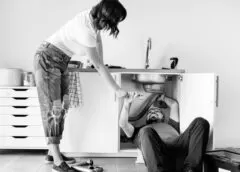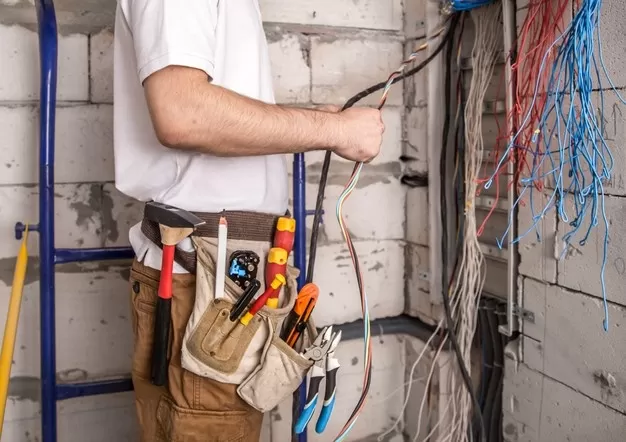Plumbing problems can cause quite an uproar for a homeowner who is not familiar with fixing these issues. Professional plumbers, on occasion, are expensive and can be a waste if they’re solving a simple problem. Keep reading to discover ways to make plumbing repairs and fixes that much easier!
Frozen and bursting pipes from harsh winter weather is a problem no one wants, so plan to winterize your exterior faucets and pipes against freezing conditions. A simple way is to find the exterior water shut-off valve inside your home (often located in the basement).
Turn off the water valve to stop the water flow and open up the outside faucets to drain any water collected. Be sure to turn off the outside water faucets tightly after the water has drained out. Take in any hoses you may have outside, so they don’t crack from the cold weather.
Ensuring you know all of your problems and having them fixed by one plumber visit is beneficial. Having them all fixed in one visit takes much money off your bill because you don’t have to pay for the visit multiple times, so make sure you make a list first.
You can check your toilet for leaks by adding a few drops of food coloring, Kool-Aid, or some coffee grounds to the toilet’s tank (not the water in the bowl). Check the water in the bowl after a half hour or so. If any of the coloring agents are visible in the water in the bowl, the tank is leaking, and you will have to have it repaired.
Check for floor damage around your toilet. If the floor around your toilet feels softer than the rest of the floor in your bathroom, there’s damage you need to address. Sit on the toilet (facing the tank) with your feet on the floor. Rock your weight onto each foot and see if you can feel any weakness or “give” in the floor. It could save money by discovering any problems before too much damage occurs.
It is not always necessary to call in a plumber when you have a damaged section of pipe in your plumbing. You can buy repair kits in your local hardware store, which are excellent for repairing leaks. If you have a small leak, you can rub a compound stick over the hole or crack in the pipe to seal it shut. Epoxy paste is also an excellent remedy for leaking pipes. Make sure you turn off the water and completely dry the pipe before applying the epoxy.
Find out the plumbing codes in your local area before starting any project. Plumbing codes can vary wildly from area to area, and you don’t want to run afoul of the codes. Visit your local building department to find out information or hire a plumber for a day to help you go over your plans and provide advice.
Before the cold season hits, check out the condition of the gutters on the roof of your house. Remove all debris, leaves, and branches to have a smooth water flow and easy drainage. Caretaking in advance will help prevent serious plumbing issues down the road.
Frozen pipes can lead to many problems, which are expensive to fix. So you want to avoid that at all costs. To avoid frozen pipes, make sure the temperature in your home never drops below 55 degrees. Look for any air leaks around your pipes and seal them up.
If you have trouble removing a clean-out plug, there are two ways to do it. First, the clean-out fitting can be loosened with a hammer and chisel. Your second option is to chisel through the plug itself.
When chilly weather approaches, it is time to disconnect your water hoses from your outside faucets. If you forget to do this, water in the hoses can freeze and expand. This can cause the faucets and the connecting pipes inside your house to freeze and break. By simply rolling up your garden hoses and storing them for the winter, you can help prevent costly plumbing repairs.
If there is a significant problem or if you do not understand plumbing, plumbing should only be done by professionals. Many of the big problems that plumbers deal with actually have simple solutions. The average person, who does not understand the intricacies of plumbing, usually compounds the problem by causing other costly damage to the house during the failed repair. The plumber will need to be called in the end, anyway.
Suppose you find that your pipes have frozen during the cold winter months. Open all the faucets in your home. This lowers the water pressure when the pipes thaw and the water is freely flowing again. Make sure to open all the faucets, not just those frequently used.
Suppose you own property where the temperature gets below freezing for an extended amount of time each year. You should ensure that pipes in unheated areas are insulated, such as crawl spaces and garages. Pipes exposed to the outside elements or those prone to freezing should be protected by heat tape or thermostat-controlled heat cables to prevent them from freezing.
Use a product like BioBen if you plan to leave your system shut off for a few weeks. Water will remain in the pipes and could start smelling because it is not moving. This product will keep the water from stagnating and from smelling too bad.
As you can see, plumbing problems don’t have to be so difficult. If you can solve the problem yourself, you can save time waiting for a plumber and save much money. Try applying what you’ve learned from this article next time you have a plumbing problem!


